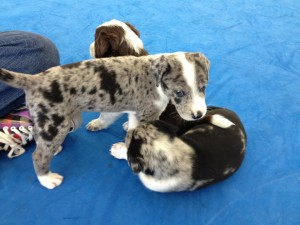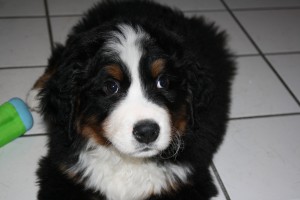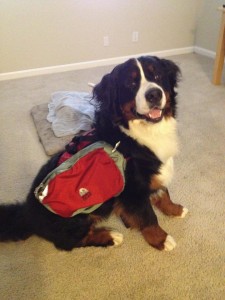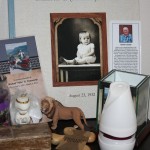 There is something wonderful and amazing about watching young animals (or humans for that matter, though I don’t have children so I can’t speak as well to that) grow, learn, experience the world, make mistakes, interact with each other, and ultimately become a functioning part of whatever society they will eventually belong. It is equally amazing how dependent young animals are on their parents, or in some cases, on us. Amazing, and frankly, quite scary.
There is something wonderful and amazing about watching young animals (or humans for that matter, though I don’t have children so I can’t speak as well to that) grow, learn, experience the world, make mistakes, interact with each other, and ultimately become a functioning part of whatever society they will eventually belong. It is equally amazing how dependent young animals are on their parents, or in some cases, on us. Amazing, and frankly, quite scary.
Last night I had the opportunity to play with three 4-week-old foster puppies, and it scares me to know that every interaction those puppies have will help to shape their personalities, their temperaments, and their behavior as adults. When it comes to animals, especially domestic animals — like dogs — who spend a significant amount of time with humans, they technically depend on us to continue shaping them for their entire lives. One minute detail might throw off their entire existence. One horrible, momentary experience could cause fear, anxiety, aggression, or any number of undesirable behaviors for the rest of that dog’s life.
As I watched the puppies, I saw them just starting to figure out their own bodies. One of the puppies hadn’t quite figured out how it’s rear end was supposed to work and kept “moonwalking” across the floor instead of turning around or simply walking backwards. Though unbelievably cute, it made it clear that even the basics about life take some time to learn and develop. Of course, these things have been known for years in the human development, animal development, and behavior worlds. But, there is something to be said about experiencing it for the first time for yourself.
 My husband and I got our puppy when he was 10 weeks old, and he exhibited many of these behaviors as well, but it is completely different watching 4-week-old puppies — siblings — figure out the world together. My puppy of course got to do some of that with his siblings as well because we got him from a breeder so he remained with his pack until he was old enough to go home with us. However, I didn’t get to see any of this first-hand. If I was given the opportunity, I think I would have realized then what a life-changing experience it was for my dog to make that drive home with completely new people and without his former human or dog pack.
My husband and I got our puppy when he was 10 weeks old, and he exhibited many of these behaviors as well, but it is completely different watching 4-week-old puppies — siblings — figure out the world together. My puppy of course got to do some of that with his siblings as well because we got him from a breeder so he remained with his pack until he was old enough to go home with us. However, I didn’t get to see any of this first-hand. If I was given the opportunity, I think I would have realized then what a life-changing experience it was for my dog to make that drive home with completely new people and without his former human or dog pack.
The puppies I saw last night were, at that moment, separated from their mother, and they did not seem to mind one bit. They were together, of course, but they didn’t seem to need their mother with them. Having their other siblings along for the ride was all they needed. Even though they were together, they had opportunities to explore on their own, and all three puppies ventured away from their siblings, making sure to stay close enough to be able to get back to the support if they needed it.
The whole thing made me realize how important other people, other beings, around us truly are. We often take for granted the support systems we have, and we don’t realize until they are gone how much we relied on them. I do this every day, I’m sure of it. These puppies will eventually be taken from their siblings, from their mother, and placed into other homes, and their support system will completely change. They will also be well-socialized dogs at that point, having been exposed to many new people, experiences, animals, etc., but it will still involve being taken from their family, the home that they have known, the others that they relied on.
 I never understood why, when I was looking for my puppy (he’s a Bernese Mountain Dog, if you are wondering), it was so important for breeders to emphasize the fact that they work hard with their puppies to socialize them, not only with other dogs, but with humans as well. Many breeders went further than that and stated that they expose the puppies to previously unknown and sometimes scary situations — crates, cars, grass, stairs, or simply being completely alone. I realize now how utterly important these things are, especially because we know those puppies will not be allowed to stay with their pack forever, and we will expect them to be comfortable doing things with us humans regularly.
I never understood why, when I was looking for my puppy (he’s a Bernese Mountain Dog, if you are wondering), it was so important for breeders to emphasize the fact that they work hard with their puppies to socialize them, not only with other dogs, but with humans as well. Many breeders went further than that and stated that they expose the puppies to previously unknown and sometimes scary situations — crates, cars, grass, stairs, or simply being completely alone. I realize now how utterly important these things are, especially because we know those puppies will not be allowed to stay with their pack forever, and we will expect them to be comfortable doing things with us humans regularly.
Often people wonder why their dog has a certain personality trait or characteristic. I never really thought about it before, but consider how many opportunities there are for humans to cause those traits in dogs, from the time they are born to the time they pass. If you think about it, it’s a wonder we manage to have any well-behaved, well-socialized dogs at all. As I was watching the puppies last night I realized how involved humans are in so many aspects of their lives, whether we are taking good care of them, or are neglecting them completely. It was just another example of how human life, simple human existence, affects other living beings, and often, we don’t even realize the impact we as a population have.
Again, all of this is argued generation after generation, but I never really understood the impact we can have until I was interacting with such innocent animals. One small move — banging the crate loudly beside them, for example — could cause a lifetime of behavioral problems. These observations can of course be expanded to include not only dogs, but any other domesticated animal, or even wild animals, and it also can include fragile ecosystems, plants, and other humans.
Being aware of these fine details is a first step toward, at the minimum, understanding why other beings (humans or animals) might be behaving a certain way. If we all were a little more aware and in tune to our surroundings and to the fact that another person or animal may have been affected by something humans have done to them, perhaps we wouldn’t be so quick to judge an action or behavior. This is wishful thinking because humans are, for the most part, selfish beings who aren’t as concerned about other living things around them as they are themselves. Even if we want to be more aware, we often miss the mark. I am certainly not exempt from this, and there are very few humans who really are.











